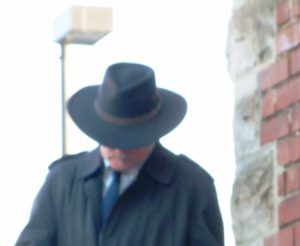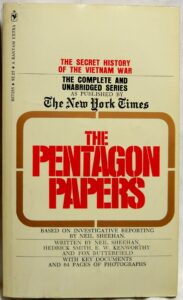On June 16, 2023, Daniel Ellsberg passed away at the age of 92. Ellsberg may be one of the most misunderstood, polarizing “whistleblowers” in U. S. history. I have spent the last few days reading his obituaries and reviewing other internet sources about his life. In my research for my novels regarding Ellsberg and his role in the Vietnam Conflict, I have a slightly different spin. Naturally, the focal point of all published articles, the writers come back to Ellsberg taking top-secret documents during the Vietnam Conflict. Ellsberg then passed these top-secret documents to Washington Journalist, Neil Sheehan, who chronicled and wrote the narrative to the Pentagon Papers. He was hailed and assailed for his actions. Hailed by the peace movement during the time of the Vietnam conflict. Assailed by the U. S. military and government for removing and disclosing the top-secret document. I also wrote a blog about Sheehan upon his passing, see attached.
To understand Ellsberg, you must understand his career path; he attend Harvard University on a four year scholarship, then graduated with a Bachelor of Arts degree, summa cum laude in Economics. His senior honors thesis was titled Theories of Decision-making Under Uncertainty: The Contributions of von Neumann and Morgenstern. In 1953, he volunteered to join the Marine Corp Officers Candidate program, where he served for three years rising to the rank of rifle platoon leader. Once he served his enlistment period, he returned to Harvard for a Master’s program.
In 1959, he joined the Rand Corporation, as strategic analyst. He was part of a team reviewing top-secret intelligence estimates of Soviet nuclear capabilities, including studying the possibilities of Soviet surprise attacks on the United States. While still employed by Rand, in 1962, he went back to Harvard and earned his Ph.D. in Economics. His doctorial thesis was titled Risk, Ambiguity and Decision, which was recently published in a Distinguished Thesis.
During the 1962, Cuban Missile Crisis, Ellsberg was sent to Washington D.C. working on one of several committees answering directly to the National Security Council.
His next career move was the one that sent him down his life’s path. In 1964, he joined the United States Department of Defense as a Special Assistant to the Assistant Secretary of Defense for International Security Affairs, John T. McNaughton. McNaughton promised him “this was my chance to study high-level decision-making from the inside, as a participant rather than as a researcher after the facts. I was hired to work for him principally on Vietnam, then a low-level American engagement that had appeared to me totally unpromising for the U.S. ever since I had visited Saigon in 1961 on a Defense Department task force. But as McNaughton held out to me: ‘You want to study crises; Vietnam is a continuous crisis’.”
Ellsberg’s first day at the Pentagon was August 4, 1964. (Does anyone see the irony of that date? Those of you who got it right, congratulations.) It was the date of the Gulf of Tonkin incident that “wasn’t an incident” but Secretary Robert McNamara and President Lyndon Johnson used it to begin their secret escalation of the Vietnam Conflict. The Military Industrial Complex at work.
It should be noted that neither McNaughton nor Ellsberg supported the escalation of this conflict in the manner as micro-managed by McNamara and Johnson. Instead, Ellsberg believed in the plan of CIA operative, General Edward Lansdale, the man responsible for CIA psy-ops, for fighting in Vietnam. Lansdale’s plan in brief summary, train the South Vietnamese to conduct a counter guerilla war against the Viet Cong. I might also add at this point, Former Five Star General Douglas MacArthur had told then President Kennedy not to put ground troops in Vietnam. Kennedy was planning on de-escalating the U.S. role in Vietnam in the middle of his term. The Military Industrial Complex was very unhappy with that potential policy change that Kennedy was planning. Well, we know what happened to him.
Ellsberg was embedded with the troops at the front line to report on the U.S.’s so called Pacification program. As the Vietnam Conflict escalated into a fighting conflict, Ellsberg became more and more disenchanted with how the war was being executed. Ellsberg believed the execution of the battle strategy and planning was creating a hopeless war. Then he contracted hepatitis, which he believed was a result of his front line operations in the rice paddies. He was sent home in June 1967.
He returned to the Rand Corporation and was assigned to a top secret Robert McNamara study on U.S. Decision-making in Vietnam, 1945-68. Ellsberg was one of only three people, the other two being project directors, to have authorized exclusive access to the entire seven thousand plus page, forty-seven volume study for purposes of research on Lessons from Vietnam. This evolved into what would become the Pentagon Papers.
Over the next three years of reading, studying, and preparing the analysis for McNamara, Ellsberg made a decision. A decision, right or wrong, and irrespective of what would happen to him. He decided the real truth had to get out, even at the cost of his own criminal prosecution.
His first thought was to take his manuscript to Congressman William Fulbright, who elected to do nothing. Next, he took the manuscript to the Washington Post, managed by former CIA operative Ben Bradlee, who elected not to publish the story or the manuscript. They didn’t want anything to do with it. Then he went to the New York Times, who started publishing it in 1971.
For his role in leaking this information, Ellsberg was charged with theft, conspiracy, and violations of the Espionage Act. Ultimately, he was convicted on twelve felony counts posing a possible sentence of 115 years, but the U.S. government’s case was dismissed when evidence surfaced about the government-ordered wiretappings and break-ins.
By the end of 1971, Bantom Books had the The Pentagon Papers published. I read it in 1972, at the behest of one of my college friends.
ON THE LIGHTER SIDE OF DANIEL ELLSBERG’S LIFE;
In my Novel Pawns 3; Stalemate, I wrote a scene based on a true segment of Ellsberg’s time in Vietnam. To set the scene, CIA agents Lucien Conein (one of my favorite real life characters) and Edward Lansdale were having a meeting with, a representative of the French Corsican Brotherhood, “Big Titted” Helene. They had called for a hit on Lansdale for damaging their drug trade coming out of Indochina. Naturally, Lansdale wanted it lifted. This is where my novel picks up:
CHAPTER NINE
December 7, 1965
Saigon
Lansdale strolled into the bar and looked around. Wherever the commotion was, that was where he would find Conein. At a table in the far corner, he heard that laugh. He was seated with two men and a woman. Undoubtedly, Conein was telling stories to keep them “entertained.” He gestured for Lansdale to come over. As Lansdale walked over, he saw two more of Conein’s men leaning on the bar watching him.
When Lansdale walked up to the table, Conein waved the two men sitting with him to leave. The woman remained. Conein pointed to a chair opposite the woman. Lansdale sat.
“Edward Lansdale,” Conein said under his breath, “I want to introduce you to Helene. She would like to speak to you.”
Lansdale reached his hand out to Helene, but the attractive French-Vietnamese wearing a low-cut blouse that exposed the tops of her large breasts made no move to accept his offer. He pulled back his hand. “So you wanted to meet me to discuss what, exactly?”
Helene leaned forward, her breasts resting on the table. “Atonine Guerini wanted me to look you in the eye and get your word that you would no longer try to undermine our operations here in the mountains,” she said in a low voice. “Well?”
Lansdale jutted his jaw, glanced at Conein, then nodded. “You have my word. I have my hands full with the mess in Vietnam that I have to straighten out. Your operations are not why my government sent me here.” Lansdale pointed at Conein. “I can’t believe Guerini would not take Lucien’s word, but if that’s how you want to do business, I have said it to your face. Now, I expect you to tell Guerini to call off the contract on me, so that I can get my job done.” Lansdale poked his finger at the table repeatedly. “You tell him that for me.”
Helene looked over at Conein, who nodded in agreement. “Guerini, has authorized me to agree to those terms, Mr. Lansdale. You don’t screw us, we won’t kill you.” Helene looked over at Conein, who nodded in agreement. Without another word, Helene got up and left.
Lansdale pushed up from the table.
Conein raised his hand. “I got something we need to discuss. Sit back down.”
Lansdale pressed his lips tightly together. “Now, what?” He sat down.
Conein looked around to make sure no one was within ear shot. “We have a little problem with your friend, Daniel Ellsberg.”
Lansdale leaned forward. “What the hell? The man hasn’t been here very long. How could he have pissed off anybody already?”
Conein drew a deep breath. “Daniel is messing around with one of the Corsican’s mistresses, and he doesn’t like it. We don’t need any more trouble. These men get real up tight when someone is messing with their women. Even their mistresses.”
Lansdale looked at Conein. “He’s your friend, too. If you want to deliver that message, I suggest you deliver it yourself. And if the Corsican were a real man, he could deliver it himself rather than ask you to be his messenger.”
Conein said, “I’m just trying to protect Ellsberg. This could get a little messy. I had to threaten to kill the man if he went after Ellsberg.”
Lansdale laughed as he got up from the table. “I got to go meet Ambassador Lodge. I don’t have time for this Corsican mistress shit.” He got up and walked out of the bar.

